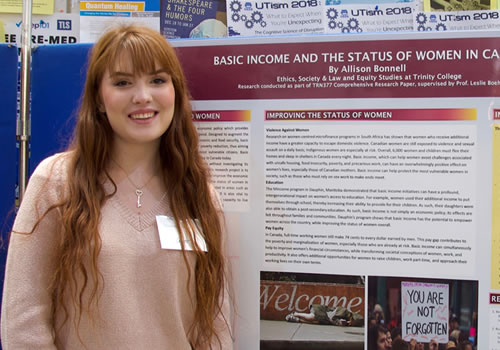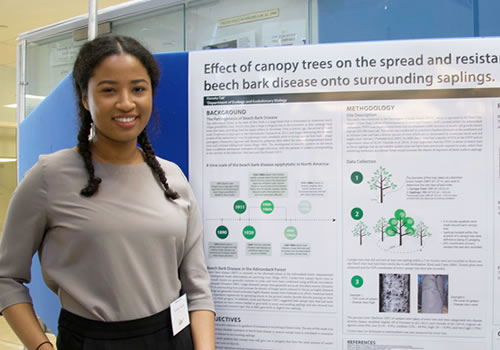It was a celebration of undergraduate research for students, by students, as the Arts & Science Students’ Union (ASSU) held its inaugural Arts & Science Undergraduate Research Conference in Sidney Smith Hall last week.
With projects that explored everything from how faces and emotional cues impact the perception of social class to the ethics of drone strikes to sex trafficking in West Bengal, 45 students from across the sciences, humanities and social sciences mixed, mingled and presented research, demonstrating the wide breadth of undergraduate research conducted on campus.
According to ASSU President Priyanka Sharma, ASSU’s goal was to promote integration between undergraduate students from all academic backgrounds in the Faculty of Arts & Science by providing an opportunity for students to share their research beyond exchanges with TAs and professors in the field.
This opportunity was not lost on participants.

Allison Bonnell, a third-year student studying ethics, society & law and equity studies, commented that she appreciated being able to display her research in a multidisciplinary environment, saying, “this conference is a unique opportunity to see the work of other people and it’s really representative of U of T as a whole and not just one program.”

Professor David Cameron, dean of the Faculty of Arts & Science, commended ASSU for highlighting the “extraordinary array” of undergraduate research projects across the faculty.
He made special note of just how far undergraduate research has come at U of T over the past 15 years.
“There has been a broadening recognition that undergraduates are capable of being autonomous researchers, making their own original contributions to the research life at the University and the world beyond,” said Cameron.
Speaking at the conference keynote presentation, U of T President Meric Gertler reaffirmed U of T’s commitment to undergraduate research, noting that the University is “committed to ensuring that every undergraduate student has opportunities to learn about and engage in research as a core component of their academic experience.”
The conference came on the heels of the recent launch of a new online tool that will make it easier for students to add research experience to their undergraduate studies. The new U of T-wide Research Catalogue found on the Career Learning Network’s website is a one-stop shop where students can go to discover research opportunities with faculty members from disciplines across the university, and contact them to find out about getting involved in their projects.
As for whether undergraduate students would recommend their fellow Arts & Science peers take on a research project?
Absolutely.
“Learning is very different from application,” said fourth-year student Hanatu Tak, who spent her field course studying the effect of canopy trees on the spread and resistance of beech bark disease on surrounding trees in the Adirondack Forest. “When you apply all the knowledge you’ve learned you realize the impact of your work and how much can come out of it. It really does prepare you for life in graduate school or even if you don’t decide to do postgraduate school it’s something you’ll fondly look back on.”

